Mike Conway runs Midnight Sun Entertainment out of Las Vegas. He has written, directed and scored four feature films: The Black Crystal, Terrarium (aka War of the Planets), The Awakening, and Exile. He also hosts IndieMeet, a get-together of like minded filmmakers to present ideas and learn from one another.
Trevor: Can you give our readers some insight on your background as a filmmaker?
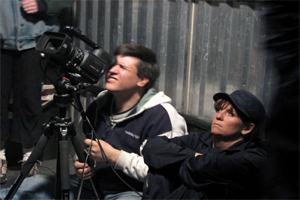 Mike: I’ve always loved movies. Been a fan first. Like horror, thrillers, comedies. Grew up on Star Trek and The Six Million Dollar Man. Then Alien came out and really blew me away. Right around that time I was making audio tapes with stories. For spaceship engines I’d turn on radio static and makes these weird little sound effects. I had this record player that could play things at different speeds. And it would kind of creep you out if your imagination was any good. But I knew I wanted to do something more visual, so I got a Super-8 camera and started making home movies. I knew I wanted to go to college. I had already made about thirteen home movies before I went to Northern Arizona University and the University of Arizona. I got on really well with the film program there. When I graduated I made this movie called The Black Crystal on Super-8. It was a feature and when it came out it got picked up by this little company called Raedon. This was during the first gulf war. They got it out there a little bit, but then they went bankrupt so they sat on the movie for years. I was kind of broke because I paid everyone to be in it. So then I moved to Vegas in ’93 and I still had the Black Crystal debt. Here I am in a new town, I’ll just walk into one of these hotels and get a job. But it was hard. You needed to be in the union for years. So I didn’t make any movies for about five years. Then I met my wife and we got married within a year. I said, “hey you wanna be in this movie?”.
Mike: I’ve always loved movies. Been a fan first. Like horror, thrillers, comedies. Grew up on Star Trek and The Six Million Dollar Man. Then Alien came out and really blew me away. Right around that time I was making audio tapes with stories. For spaceship engines I’d turn on radio static and makes these weird little sound effects. I had this record player that could play things at different speeds. And it would kind of creep you out if your imagination was any good. But I knew I wanted to do something more visual, so I got a Super-8 camera and started making home movies. I knew I wanted to go to college. I had already made about thirteen home movies before I went to Northern Arizona University and the University of Arizona. I got on really well with the film program there. When I graduated I made this movie called The Black Crystal on Super-8. It was a feature and when it came out it got picked up by this little company called Raedon. This was during the first gulf war. They got it out there a little bit, but then they went bankrupt so they sat on the movie for years. I was kind of broke because I paid everyone to be in it. So then I moved to Vegas in ’93 and I still had the Black Crystal debt. Here I am in a new town, I’ll just walk into one of these hotels and get a job. But it was hard. You needed to be in the union for years. So I didn’t make any movies for about five years. Then I met my wife and we got married within a year. I said, “hey you wanna be in this movie?”. 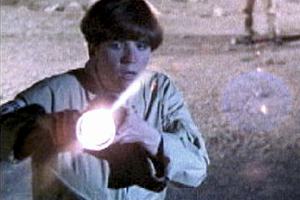 So I put her in this movie called Eternal. I was still pretty new to Vegas and trying get back on my feet. I had to borrow a friend’s VHS-C video camera to make it. There was a crying scene and I asked Sheila (Mike’s wife) if she wanted me to chop an onion, but she said, “no, I’ll just think of you dead.” I was like wow! That’s pretty cool, she’s method acting. I told her, “if you can do that then you can play the psycho bitch in my Road Kill movie.” We did that the next year in ’99. Then I said alright lets make a feature! I had a steady job at that point and started to put some money together. Terrarium is a 16mm film so its gonna cost you $4,000 just for the film stock. After additional expenses including developing and transfer it eventually hit $27,000 altogether. That was a costly endeavor.
So I put her in this movie called Eternal. I was still pretty new to Vegas and trying get back on my feet. I had to borrow a friend’s VHS-C video camera to make it. There was a crying scene and I asked Sheila (Mike’s wife) if she wanted me to chop an onion, but she said, “no, I’ll just think of you dead.” I was like wow! That’s pretty cool, she’s method acting. I told her, “if you can do that then you can play the psycho bitch in my Road Kill movie.” We did that the next year in ’99. Then I said alright lets make a feature! I had a steady job at that point and started to put some money together. Terrarium is a 16mm film so its gonna cost you $4,000 just for the film stock. After additional expenses including developing and transfer it eventually hit $27,000 altogether. That was a costly endeavor.
T: You self distributed Terrarium on DVD from 2003-2005. I was working at a Blockbuster circa 2005 and this weird low budget film came in titled “War of the Planets”, when I read the synopsis on the back I was surprised to learn it was Terrarium. This disc is being distributed by Lions Gate at the moment, can you go into any detail on how Terrarium found its way to video shelves across the country?
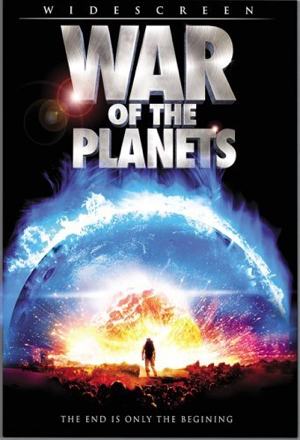 M: Basically we shot in 2000 and had a little premiere and a giveaway on IndieClub.com. It was going alright, but I didn’t get distribution until 2005. Terrarium was out there and getting nips at it. There was this company called Silver Nitrate. This guy, who was the negotiator, he talked to my rep and he said, “Terrarium is alright but we want to see some action right on the outset. Take us to the alien planet right away.” I thought, “man I have to hire an effects guy.” Because of all the feedback on the film I did kind of a good and a bad thing. Its good to take criticism, but its bad to take every comment and do something about it. You should stay true to what motivated you or what the original vision was. You can’t please everybody. So we eventually got that version released by Lions Gate. How it came to be on store shelf’s is complicated, there was this company called Lightning Entertainment. They offered to buy the movie. I thought, “great someone finally bought it.”, but they changed the name to War of the Planets because of the Tom Cruise movie War of the Worlds. They went to Lions Gate saying, “hey we got War of the Planets.” It was a luck situation where Lions Gate was looking for something to release across from the Tom Cruise movie. Their whole strategy was to release a week earlier and take all that market. And they did. So you had Blockbuster and Hollywood Video snagging up all these copies. There was a Hollywood Video around here, just outside of Vegas, someone called me and said, “you know there’s like fifty copies of your movie on the shelves over here.” And I said, “ya and there’s a bunch of pissed off customers looking for Tom Cruise.” It was
M: Basically we shot in 2000 and had a little premiere and a giveaway on IndieClub.com. It was going alright, but I didn’t get distribution until 2005. Terrarium was out there and getting nips at it. There was this company called Silver Nitrate. This guy, who was the negotiator, he talked to my rep and he said, “Terrarium is alright but we want to see some action right on the outset. Take us to the alien planet right away.” I thought, “man I have to hire an effects guy.” Because of all the feedback on the film I did kind of a good and a bad thing. Its good to take criticism, but its bad to take every comment and do something about it. You should stay true to what motivated you or what the original vision was. You can’t please everybody. So we eventually got that version released by Lions Gate. How it came to be on store shelf’s is complicated, there was this company called Lightning Entertainment. They offered to buy the movie. I thought, “great someone finally bought it.”, but they changed the name to War of the Planets because of the Tom Cruise movie War of the Worlds. They went to Lions Gate saying, “hey we got War of the Planets.” It was a luck situation where Lions Gate was looking for something to release across from the Tom Cruise movie. Their whole strategy was to release a week earlier and take all that market. And they did. So you had Blockbuster and Hollywood Video snagging up all these copies. There was a Hollywood Video around here, just outside of Vegas, someone called me and said, “you know there’s like fifty copies of your movie on the shelves over here.” And I said, “ya and there’s a bunch of pissed off customers looking for Tom Cruise.” It was 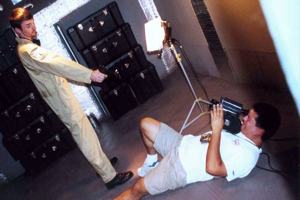 marketed as something it wasn’t. We even got the same voice over talent to do our trailer that did the War of the Worlds trailer. They put monsters on the cover that weren’t in the movie and some guy in a space suit which wasn’t in it. But it was a pretty big release. 100,000 copies in the U.S. and Canada. Then we got some other deals with Japan and Thailand. It basically took untill about 2007 to recoup costs. I was trying to do self distribution and trying to do stuff on my own. Over the course of several years we ran it up to forty-eight grand. We eventually refinanced our house and rolled it into that. But eventually we made $52,000 with all the deals. So we recouped over the years, but because this money is trickling in we racked up credit cards to get by.
marketed as something it wasn’t. We even got the same voice over talent to do our trailer that did the War of the Worlds trailer. They put monsters on the cover that weren’t in the movie and some guy in a space suit which wasn’t in it. But it was a pretty big release. 100,000 copies in the U.S. and Canada. Then we got some other deals with Japan and Thailand. It basically took untill about 2007 to recoup costs. I was trying to do self distribution and trying to do stuff on my own. Over the course of several years we ran it up to forty-eight grand. We eventually refinanced our house and rolled it into that. But eventually we made $52,000 with all the deals. So we recouped over the years, but because this money is trickling in we racked up credit cards to get by.
T: You’ve created quite a community around your films. Working with several of the same actors, especially your wife. She seems very supportive of something most wives would complain about. Has working on the set with her strengthened or strained your relationship in any way?
M: Yes she is more supportive when she’s involved. It does attach you to the project; when you’re playing in it, making food for the cast and there for the whole process of it, from reading the script and trying to sell it. But when she hears me come up with another idea for a movie she says, “why don’t we try making money back on Exile first.” I’m like, “I know… this f’ing economy right now.”
T: You composed the music for all of your films. You even use a lot of synthesized music that’s reminiscent of John Carpenter scores. How did you get into the music side and when did you decide that you’d rather just do it yourself instead of going for outside talent?
M: I love doing the music. It started out, I was always into soundtrack music. My sister got the piano lessons, I didn’t play anything. But I listened to Jerry Goldsmith, John Williams and Tangerine Dream. So I knew the sound i liked. Of 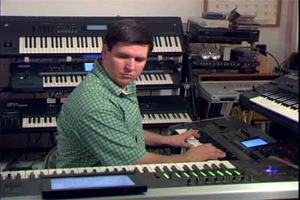 course John Carpenter was a huge influence. Man this guy can make Halloween for three hundred thousand bucks, score it himself and get it in a theater. That’s just amazing. So early Carpenter, that’s just vintage stuff. And i really liked the sound. I didn’t know what synthesized stuff was. At first I was trying to get composers involved. “Ya I’m in a band. I can score your stuff.” Yet when it came time to get together, I felt like that’s just a guy I talk to once in a while. This isn’t gonna be a collaboration, its just not. And when it came down to actually doing this stuff, especially when you don’t have money, its hard to get people to commit. So I just went out and started looking at keyboards. I was just really amazed at all the little directions you could go in with synthesis. So eventually I started buying. Every other year I was buying a new keyboard or drum machine. I was like a one fingered typist. I didn’t know what chords were. I started learning what a fourth and a fifth or a major third and minor third were. I was like, “oh wow, John Williams does these minor fifths all the time, that’s a sound I really like.” I don’t want to pretend like I’m fooling people, like “hey that’s a real orchestra.” Anybody with some brains is gonna go, “No that’s synthesized.” I may mix in some orchestral samples, but I’m not trying to pull the wool over anybody’s eyes, its just a sound I like.
course John Carpenter was a huge influence. Man this guy can make Halloween for three hundred thousand bucks, score it himself and get it in a theater. That’s just amazing. So early Carpenter, that’s just vintage stuff. And i really liked the sound. I didn’t know what synthesized stuff was. At first I was trying to get composers involved. “Ya I’m in a band. I can score your stuff.” Yet when it came time to get together, I felt like that’s just a guy I talk to once in a while. This isn’t gonna be a collaboration, its just not. And when it came down to actually doing this stuff, especially when you don’t have money, its hard to get people to commit. So I just went out and started looking at keyboards. I was just really amazed at all the little directions you could go in with synthesis. So eventually I started buying. Every other year I was buying a new keyboard or drum machine. I was like a one fingered typist. I didn’t know what chords were. I started learning what a fourth and a fifth or a major third and minor third were. I was like, “oh wow, John Williams does these minor fifths all the time, that’s a sound I really like.” I don’t want to pretend like I’m fooling people, like “hey that’s a real orchestra.” Anybody with some brains is gonna go, “No that’s synthesized.” I may mix in some orchestral samples, but I’m not trying to pull the wool over anybody’s eyes, its just a sound I like.
T: Let’s talk a little about IndieMeet. This is a gathering of indie film-making talent that you host every Memorial Day weekend. You’ve been doing this for just over half a decade now. What can one expect to find at one of these meetings?
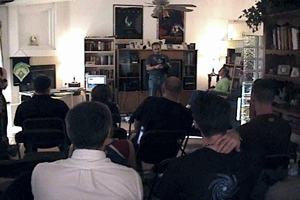 M: As you know when I make a movie I give copies away. Its hard to sell indie filmmakers on buying films. I was fairly new to the forum, IndieClub.com. Hadn’t been on internet a lot. The whole idea of hanging out with people online was new. I was there for a month or two and thought, “you know I want people to actually see Terrarium.” Users were saying, “I’d really like to see your movie, maybe when I get the money.” And I thought, “hey why not now?” So I came up with the 100 copy giveaway. As a result IndieMeet was kind of born out of that. Someone said,”We should have a get together and share ideas.” Then someone else said, “why don’t we have it at Mike’s house in Vegas?” Everyone knew who I was and what films I had made. Plus being in Vegas, lets face it, if I were in Tucson it would be a harder sale! You got guys like Christian Viel (Recon 2020) and Peter Ross (Horrors of War) coming out from Ohio and Canada and its like, “sure you can stay at the house.” Its a big slumber party for three days. I wanted it to be a sharing of ideas, but it needed to be fun too. You come here, eat some really good food, watch a lot of other indie movies and relax. The format is like this: it starts on Friday night with a meet and greet. Once it’s dark everybody heads into the backyard. We rent about seventy chairs and set it up theater style facing a ten foot screen linked to a projector and speakers. Whoever comes, is free to bring their reels. For the features i like to seek people out. I want to be able to say, “that’s a movie I’m interested in seeing”, as opposed to saying, “ooh ya bring that really boring looking drama and we’ll watch it for two hours.” If you don’t have something exciting people start bailing. We watch movies until early in the morning, and we always sleep in. We start presentations Saturday afternoon. People show how to make squibs and fake blood. We had some guys do a stunt sword fight. Everybody does some really cool presentation. I try and get people lined up, like martial artists or make-up artists. Someone will put on a green screen suite and show how they made a ball float. Last year we made a one minute movie. We added some animation and a few different things with green screen, cloning and digital effects to show what you could do. Then we go back to movies on Saturday night. That goes to late in the morning. Then on Sunday we get up for a two o’clock matinee and go see whatever summer movie is opening up. We try and work a Hollywood movie into the IndieMeet just to remind us that why were having fun. Just because we’re indies doesn’t mean we hate Hollywood, we love Hollywood. Then we end with a barbecue. I didn’t know it would go on for six years. It was so much fun the first year, people just kept coming back.
M: As you know when I make a movie I give copies away. Its hard to sell indie filmmakers on buying films. I was fairly new to the forum, IndieClub.com. Hadn’t been on internet a lot. The whole idea of hanging out with people online was new. I was there for a month or two and thought, “you know I want people to actually see Terrarium.” Users were saying, “I’d really like to see your movie, maybe when I get the money.” And I thought, “hey why not now?” So I came up with the 100 copy giveaway. As a result IndieMeet was kind of born out of that. Someone said,”We should have a get together and share ideas.” Then someone else said, “why don’t we have it at Mike’s house in Vegas?” Everyone knew who I was and what films I had made. Plus being in Vegas, lets face it, if I were in Tucson it would be a harder sale! You got guys like Christian Viel (Recon 2020) and Peter Ross (Horrors of War) coming out from Ohio and Canada and its like, “sure you can stay at the house.” Its a big slumber party for three days. I wanted it to be a sharing of ideas, but it needed to be fun too. You come here, eat some really good food, watch a lot of other indie movies and relax. The format is like this: it starts on Friday night with a meet and greet. Once it’s dark everybody heads into the backyard. We rent about seventy chairs and set it up theater style facing a ten foot screen linked to a projector and speakers. Whoever comes, is free to bring their reels. For the features i like to seek people out. I want to be able to say, “that’s a movie I’m interested in seeing”, as opposed to saying, “ooh ya bring that really boring looking drama and we’ll watch it for two hours.” If you don’t have something exciting people start bailing. We watch movies until early in the morning, and we always sleep in. We start presentations Saturday afternoon. People show how to make squibs and fake blood. We had some guys do a stunt sword fight. Everybody does some really cool presentation. I try and get people lined up, like martial artists or make-up artists. Someone will put on a green screen suite and show how they made a ball float. Last year we made a one minute movie. We added some animation and a few different things with green screen, cloning and digital effects to show what you could do. Then we go back to movies on Saturday night. That goes to late in the morning. Then on Sunday we get up for a two o’clock matinee and go see whatever summer movie is opening up. We try and work a Hollywood movie into the IndieMeet just to remind us that why were having fun. Just because we’re indies doesn’t mean we hate Hollywood, we love Hollywood. Then we end with a barbecue. I didn’t know it would go on for six years. It was so much fun the first year, people just kept coming back.
T: With Exile being your most expensive film yet, were there any pitfalls or triumphs you’d like to share with us?
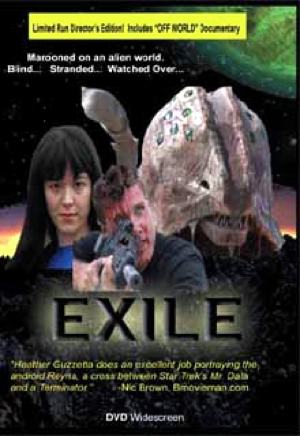 M: I have this friend at Lions Gate. He tells me, “lets get together and make another sci-fi movie. You me and another guy, we’ll each put in $6,000 and I know Mike Elliot from Devil’s Rejects and he can match our money. So for $35,000 we can make this. We can even use the same cast from Terrarium. You can write and direct it and I’ll produce from LA.” That’s when I came up with the Exile idea. Heather Guzzetta from The Awakening, plays this tall girl who gets super strong. She’d be perfect for an android. I thought let’s have something with a lot of adventure and a sci-fi element mixed in. Unlike Terrarium, which is this real talkie movie. So Exile starts off with a shuttle getting hijacked. Then the people get eaten by this tentacled monster. I told this idea to these guys and they’re response was, “I don’t know. A guy falls in love with this android? The guy and the girl, that’s gonna take some acting to pull it off. No let’s do something more hack’n’slash.” So they told me their ideas, and they wanted to do something more slice and dice. Lions Gate is really into that and if we’re going through the studio, then that’s what they’re going to want. I don’t shy away from that stuff, but I had already come up with this idea that I loved! So I told my wife, “let’s just use our home equity and do it ourselves. Let’s just make it how we want to make it.” I tend to bite off more than I can chew. “Alright no three point lighting. Hand held gorilla doing it fast.” Every indie movie will have these obstacles, not just me. It’s like my lead actor shot for one day and he’s not gonna do it now. You have these obstacles thrown at you and the more you overcome, the better you’ll be. Eventually it gets to a point where if you start building up your work, the more people will get behind it. Which was a really great feeling on Exile, my fourth feature. I went into it with the mind-set, “were gonna do everything professional. We’ll have a pro DP and his jib.” Then the DP doesn’t show up. We had done some test shots and he was on board initially, but then he just doesn’t call. Sometimes people ask me, “why do you try to do everything yourself?” I usually say , “I didn’t intend to.”
M: I have this friend at Lions Gate. He tells me, “lets get together and make another sci-fi movie. You me and another guy, we’ll each put in $6,000 and I know Mike Elliot from Devil’s Rejects and he can match our money. So for $35,000 we can make this. We can even use the same cast from Terrarium. You can write and direct it and I’ll produce from LA.” That’s when I came up with the Exile idea. Heather Guzzetta from The Awakening, plays this tall girl who gets super strong. She’d be perfect for an android. I thought let’s have something with a lot of adventure and a sci-fi element mixed in. Unlike Terrarium, which is this real talkie movie. So Exile starts off with a shuttle getting hijacked. Then the people get eaten by this tentacled monster. I told this idea to these guys and they’re response was, “I don’t know. A guy falls in love with this android? The guy and the girl, that’s gonna take some acting to pull it off. No let’s do something more hack’n’slash.” So they told me their ideas, and they wanted to do something more slice and dice. Lions Gate is really into that and if we’re going through the studio, then that’s what they’re going to want. I don’t shy away from that stuff, but I had already come up with this idea that I loved! So I told my wife, “let’s just use our home equity and do it ourselves. Let’s just make it how we want to make it.” I tend to bite off more than I can chew. “Alright no three point lighting. Hand held gorilla doing it fast.” Every indie movie will have these obstacles, not just me. It’s like my lead actor shot for one day and he’s not gonna do it now. You have these obstacles thrown at you and the more you overcome, the better you’ll be. Eventually it gets to a point where if you start building up your work, the more people will get behind it. Which was a really great feeling on Exile, my fourth feature. I went into it with the mind-set, “were gonna do everything professional. We’ll have a pro DP and his jib.” Then the DP doesn’t show up. We had done some test shots and he was on board initially, but then he just doesn’t call. Sometimes people ask me, “why do you try to do everything yourself?” I usually say , “I didn’t intend to.”
T: What can we expect in future films from you?
M: I want to do a horror flick. Its kind of Fatal Attraction meets Paranormal Activity. I’d film it in my house, using an exisiting world. You’re not making a huge set or spending money on props. Just using what’s there. Since I have all the equipment from Exile I only have to worry about composing better shots. People are going to notice camera movements. You can fake production value if you take the time.
T: Anything more you’d like to comment on or talk about?
M: I did this tutorial DVD for the Oasys keyboard. Its a very complex piece of machinery. Its got seven different synthesizer engines in it. Many people want help understanding it. I had enough experience with synths that I took to it very quickly. I was on this forum explaining it to a guy. He asks, “how do I use the ten outputs to route different drums and put effects on them?” So I wrote him this long explanation. This guy happened to be Andrew Bonime, the producer of C.H.U.D.! So he had an Oasys, and its a high end piece of gear. Its not your typical keyboard it had an elite clientele. He says, “you know what? What you just did for me, that’s amazing. You should video tape yourself doing that and sell it. So guys like me know how to work this thing.” So I made the DVD its over three hours long and we’ve sold over 400 copies. And its still selling.
T: Its nice to see a filmmaker out there who still loves movies this much. Someone that still is making them no-holds-barred.
M: Ya I’m pretty reckless. You know most people, they got into drugs or being pirates on the high seas, I gotta make these cheesy movies.
– Check Out Our Reviews of Mike’s Films –
Terrarium (aka War of the Planets) – Review
The Awakening – Review
Exile – Review
Purchase DVD Copies At: http://www.midnightsunent.com/orderdvds.php
Buy It From Amazon: War of the Planets

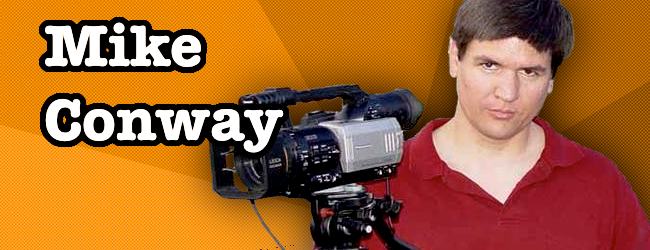
The resolution. 16mm is physically bigger than 8mm so it can record a bigger picture. Also better cameras and lenses are available for 16mm as it’s a more “professional” format than 8mm. In general 16mm is better than 8mm, but it depends on what your camera setup is and if you’re taking the time to light and shoot the scene properly.
Whats the difference between 8mm film versus 16mm? I don’t see any differences…